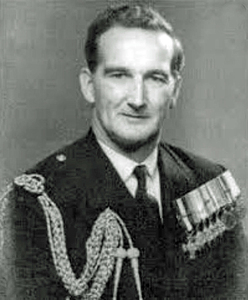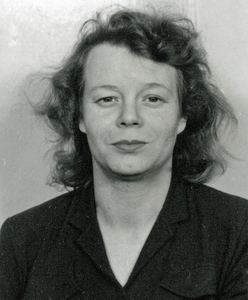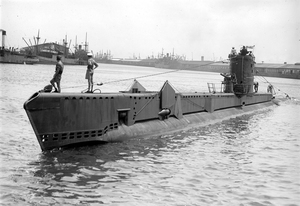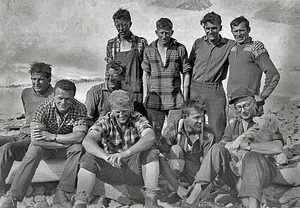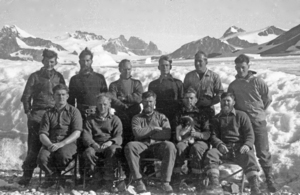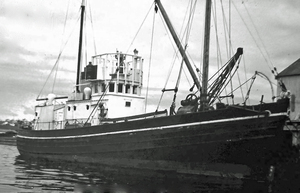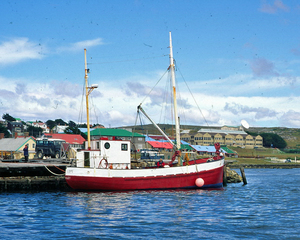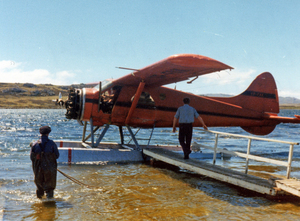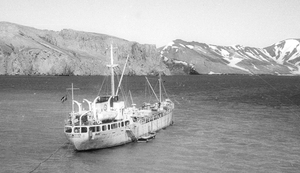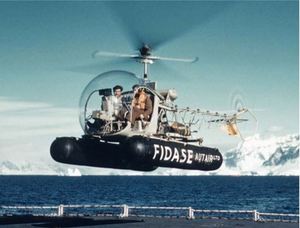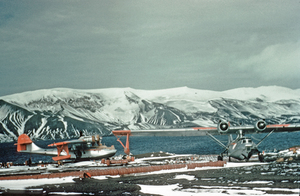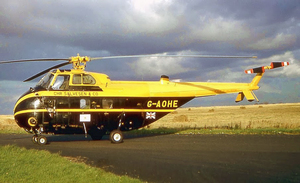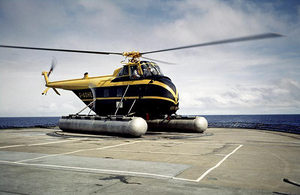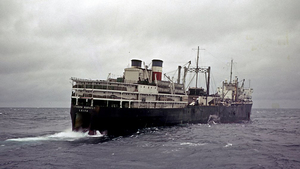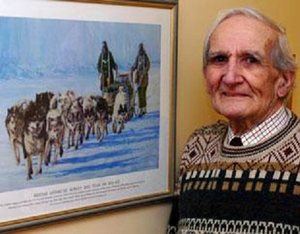HUCKLE, JOHN SIDNEY RODNEY
1924-2013 from England (also Falkland Islands)
Naval officer, DSC (and Bar) governor's ADC and Antarctic explorer, was born on 22 June 1924 at Abbot’s Langley; his father was the manager of a local paper mill. He was educated at Berkhamsted school, where he won the sword of honour as the outstanding cadet in the Officers Training Corps (OTC). Huckle left school at seventeen and he joined the Royal Navy as an Ordinary Seaman.
Huckle soon became a midshipman in the Royal Naval Volunteer Reserve (RNVR). His initial training was on the battleship HMS King George V, after which he transferred to service in submarines. Later he became a submarine warfare officer in the destroyer HMS Calder, which was credited with sinking the German U-boat U-1051on 26 January 1945 near the Isle of Man. For his part in this operation Huckle was awarded the Distinguished Service Cross. He was subsequently awarded a bar to his DSC for further action against another U-boat.
After leaving the Royal Navy in 1946, Huckle applied to enter the colonial service and he was accepted. He was due to sail to the Gold Coast {now Ghana} to serve as an assistant district officer. By chance he noticed an advert in the Evening Standard for volunteers to serve in the Falkland Islands Dependencies Survey (FIDS), which he immediately applied to join. During the journey south onboard RMS Lafonia he met Miles CLIFFORD, who was travelling to the Islands to take up his appointment as governor. This meeting was to have a significant impact on the lives of the two men. Clifford asked Huckle to defer his appointment to the staff of FIDS, and instead become his ADC in the Falklands. Huckle agreed - and the two men struck up a lasting friendship; Huckle became a key player in some of Miles Clifford’s ambitious plans for the Falkland Islands.
Miles Clifford began a ‘root and branch’ review of the workings of the FI Government – and Huckle was required to attend any departmental inspection and to keep detailed notes about what was found and what was required to be done. Huckle commented about his early days as the ADC:
Once we got to Port Stanley, that’s when life became much more hectic. There were all sorts of things like the deciphering of confidential ciphers to the governor, which Clifford was very good about it; he used to let me read them nearly all, and it was then I began to realise that there was more to this business than had met the eye when I was in London. Because some of the ciphers were dealing with the fact that the Argentines and the Chileans, amongst others, were mounting expeditions to go down into our sector of the Antarctic.
Clifford was anxious about the lack of effective transport for doctors to deal with medical emergencies, and also for the need to provide TB screening. These issues were quickly addressed. The outcome of these reforms was the fitting out of the MV Philomel with a mobile X-ray unit to screen for tuberculosis (which was considered a serious problem at that time) particularly for those living on the outer islands and remote settlements. Huckle soon found that with his naval background he became a relief skipper for the Philomel on its trips around the Islands. Clifford also pressed the Colonial Office hard to finance the formation of a government air service (initially as an air ambulance service) with the purchase of two small Auster aircraft. Huckle later qualified as an additional aircraft pilot for the Falkland Islands Government Air Service (FIGAS).
Vernon Steen, a later manager of FIGAS recalls:
John Huckle was here when I was a young lad … As a boy I would hang out during the school holidays at the FIGAS hangar at the west end of the harbour … I think he was the reason why Ian CAMPBELL took up flying … As part of the 50th anniversary we invited those that played a significant part in the setting up and initial running of this unique service and John Huckle was on the list … but he had other commitments and was unable to spare the time. He wrote to me later saying how sorry he was … I think he would have been the icing on the cake.
On Christmas Eve, 1946, Clifford asked Huckle if he would carry out a brief visit to the Dependencies to assess the situation. “It will be a holiday for you”, he said, “and you should be back within three weeks, a month at the most.” As things turned out it would be three years and two months before Huckle returned to the Falkland Islands. On 1 January 1947 Huckle sailed in the Newfoundland sealer Trepassey on passage to the South Shetlands and Deception Island.
After re-establishing the base on the Argentine Islands (the former base of the British Grahamland Expedition of the 1930s) Huckle was asked to occupy the base at Port Lockroy (accompanied by the Falkland Islander – Jimmy Smith). Life for Huckle and Smith at Port Lockroy was very spartan. They had no radio, the bare minimum of food. Huckle spent a good deal of his time as base commander and as Clifford’s representative at Port Lockroy, delivering protest notes to visiting Argentine and Chilean warships re-affirming British Sovereignty over the Dependencies. With the end of the summer season and the closure of Port Lockroy, Huckle was asked by Clifford, to return to Deception Island, for the winter, as base leader – and he continued to hand out protest notes to visiting foreign warships.
At the beginning of 1948 Dr (later Sir) Vivian FUCHS arrived as the new leader of FIDS and he established a new southernmost base at Marguerite Bay on Stonington Islandin Marguerite Bay. Fuchs was much impressed with the abilities and resourcefulness of Huckle. Clifford offered Fuchs the services of Huckle for the coming season. Huckle commented:
As a compensation for the tedious sojourn on Deception Island, Clifford asked me if I would like to be transferred to a ‘sledging base’ the following year; something which would provide an opportunity to take part in genuine exploration before leaving Antarctica.
During the next few months Huckle drove a team of huskies on long exploration journeys to survey King George VI Sound. Huckle and the surveyor – Colin Brown – got on well together and they covered 100 miles in three weeks. Initially Huckle knew nothing about dog sledging – but, as with everything, he learnt quickly. The pair were out for a total of 90 days – all without a radio. It was hard and tiring work, but Huckle greatly enjoyed working with the huskies.
The following year the pack ice prevented the relief ship RRS John Biscoe I from reaching the base, and Fuchs and ten others (including Huckle) were forced to remain at Stonington for another year. During this time, long surveying trips were accomplished, and a full-scale study of Emperor penguins was undertaken.
Eventually Huckle was flown to Deception Island onboard the Norseman seaplane where he joined the frigate HMS Bigbury Bay for the journey back to Stanley. Lady Clifford met him at Government House and said:
"Well after your trip you must need a decent bath, John." Huckle thought that "I don’t know whether she thought I had been away three years without a decent bath, but anyhow – but I think that was the understatement of the year. … I had gone away on a three-week cruise and had returned after three years."
Huckle was long overdue for UK leave, but once again governor Clifford said, “John I have got a little job for you before you go on leave.” Clifford explained that FIDS had purchased the ketch Penelope. to carry out survey work on the harbours of South Shetland Islands, but the skipper of the boat, who had been brought out from the UK to man the vessel, had declared her unseaworthy. Huckle considered the ketch seaworthy but thought rigorous sea trials were required and sailing up and down Stanley Harbour would be insufficient. Governor Clifford asked Huckle to carry out a sufficiently demanding Falkland Islands-based task – the delivery of the first radio telephones to outlying islands and remote settlements. Huckle later commented:
The delivery of radiotelephones was certainly the biggest advance in the internal communications of the Falklands that had ever been made. There had been no other advance in the internal communications as great as that voyage had been, when … well over a dozen farms were connected up to the doctor.
On completion of the delivery and installation of the radio telephones Huckle was free to return to the UK on two months leave. He flew home from Montevideo on a DC6 – a journey which took thirty-six hours, which Huckle described as being remarkably quick for those days. During this period, he became a member of the Antarctic Club.
On his return from leave to Stanley, once again governor Clifford had a “little job” for him to do with Penelope. A stout work boat was required for moving cargo for the Colonial Development Corporation’s (CDC) project of the new abattoir at Ajax Bay. Sand and gravel from Fanning Head had to be moved over San Carlos Water for the construction work. For ten weeks Penelope criss-crossed San Carlos Water hundreds of times towing a converted wartime landing craft laden with sand and gravel. Huckle and the crew of three worked for thirteen hours a day, seven days a week – and were paid handsomely for the work – bonusses were based on the amount of sand and gravel moved.
On completion of the Ajax Bay work the Penelope was sold and Huckle was now unemployed. He was no longer on the staff of FIDS. Clifford was keen to retain the services of his very able ADC (which was an unpaid role) and he asked him if he were willing to become Harbourmaster. The job also included being Registrar of Shipping, Receiver of Wrecks and Superintendent of Lights and Beacons.
One governor Clifford’s major innovations was the introduction of the government air service (FIGAS). He had initially purchased two second-hand Auster aircraft (for £230 each) and later a Norseman seaplane. Vic SPENCER was appointed as the first pilot, but Clifford soon realised that a second relief pilot was needed. Clifford asked Huckle to travel to the UK and to qualify as a pilot. He left immediately for the UK, during the 1953 Coronation celebrations, and within six months he was back in the Falkland Islands as a qualified pilot with a commercial licence.
In August 1953 John Huckle was awarded the Polar Medal for his work in the Antarctic.
On his return to the Falklands Huckle shared the actual flying with the other pilot Vic Spencer, while at the same time assuming the duties (in addition to being Harbourmaster) as the first Director of Civil Aviation. Vic Spencer usually concentrated on the passenger service, while Huckle did the medical emergency flights and the settlement mail drops – he described the mail drops as “great fun”. During Huckle’s time as the Director of Civil Aviation there were no accidents and FIGAS carried over 2000 passengers every year. He continued to act as a relief master for Philomel when her master was on holiday - usually when Philomel was acting as the hospital vessel. When a new governor was appointed in 1954 - Sir Raynor ARTHUR – Huckle ceased to be an ADC and he concentrated on his job of running the Harbour and Civil Aviation Department, but after ten years in the Falkland Islands he resigned to seek pastures new.
Within six months of leaving Stanley Huckle was back in the Falkland Islands – this time as first mate of the M/V Oluf Sven, which was the support vessel for the Falkland Islands Dependencies Aerial Survey Expedition. (FIDASE). This expedition carried out an aerial survey of the Falkland Islands, the Dependencies and the Antarctic Peninsula, and was funded by the Colonial Office. The survey was conducted by Hunting Aerosurveys. Based at Deception Island, the survey used Canso flying boats (the Canso was a Canadian -manufactured version of the Catalina flying boat/amphibian which had a range of over 4,000 miles) and also small helicopters. Oluf Sven served as transport and support vessel for the whole expedition and its staff. The survey took place in the southern summers of 1955/56 and 1956/7.
During the two years of the expedition 35,000 square miles of the South Shetland Islands and much of the Antarctica Peninsula southwards to 68°S had been mapped. Between October and November 1958, a complete vertical coverage of the Falkland Islands (total of 4,500 square miles) was undertaken.The two Canso aircraft had logged 906 flying hours equivalent to 130,000 nautical miles of flying. Hunting AeroSurveys produced 17,000 nine-inch square contact prints. The leader of the expedition, Peter Mott, was in no doubt that John Huckle played a leading role in the second season and contributed towards the eventual success of the expedition.
After the aerial survey was completed Huckle was once again without a job,but while he was flying for FIGAS, on several occasions, Captain Harold SALVESEN (Chairman of Christian Salvesen Whaling Company - from Leith in Scotland) was a passenger in the plane:
I flew him around and we got chatting from time to time … as we were going around the islands. And when he was leaving he said “Well if ever you want to change your job, and don’t know what to do, come and see me in Leith and I shall see if I can give you something to do‟.
After the FIDASE was completed Huckle decided not to return to the Falklands but rather to go to Leith and see Harold Salvesen:
When I did decide to leave [the Falklands], I did go to Leith, and I asked to see H. K. Salvesen and he said “What do you want?‟ and I said “Well you said I could come to you for a job, well here I am – what have you got? ‟He said “Oh, we want helicopter pilots for our whaling factories‟. And I said “Well, I don’t fly helicopters‟. He said “That’s alright we’ll give you a course‟. So that was how I got that, which was all to the good.
Huckle signed a three-year contract with Salvesens and promptly trained as a helicopter pilot at the home base of Salvesens’ Air Unit at Cheltenham. He subsequently spent three whaling seasons flying helicopters from the pelagic whaling factory ships – Southern Harvester and Southern Venture. Huckle later commented that be a helicopter pilot flying from whaling factory ship was:
The riskiest undertaking in my life. Searches for whales with Whirlwind choppers powered only by a single piston engine sometimes extended more than a hundred miles from the mother ship over freezing seas where rescue following a ditching would be problematical.
With the end of helicopter operations by Salvesens in 1963, John Huckle once again found himself unemployed. He soon joined World Wide Air Services – an Anglo-American company that specialised in providing support for companies engaged in oil exploration. He began work as an aircraft pilot flying a variety of aircraft – but later on he managed a whole range of overseas operations. He continued to work with this company until he finally retired.
In retirement in Monmouth, with his second wife Eileen, John Huckle continued to be as busy as ever. He loved historical research and wrote many articles about his life and adventures in various publications. John Huckle was a natural raconteur and became much in demand as an after-dinner speaker. He served as a warden at Samlesbury Hall, Preston in Lancashire in his latter years.
John Huckle led a very active and exciting life. He was a decorated wartime Royal Naval officer, a governor’s ADC, an Antarctic explorer, a mariner, a navigator, a pilot of fixed and rotary winged aircraft, a harbourmaster, and a director civil aviation. John Huckle was one of the earliest FIGAS pilots. Right from his school days Huckle had a taste for adventure. He was a multi-talented man who was clearly able to turn his hand to a bewildering range of jobs throughout his long life. Those who came into contact with John Huckle soon came to rely on his vast experience, his knowledge, skills and his ability to keep calm under pressure.
John Huckle, married Anne Hargreaves, a Camp teacher, on 12 January 1952 at Christ Church cathedral. Among the witnesses were governor Miles Clifford and Captain Vic Spencer and John Sedgwick. Two children were born in the Falklands - Penelope Malvina Huckle in 1954 and Michael Patrick Huckle born in 1955. Another child, a son, was born after the Huckles left the Falkland Islands. John and Anne subsequently divorced.
John Huckle married his second wife, Eileen, in 1966.
John Huckle died on 9 December 2013, aged 89. His funeral took place on Monday 23 December 2013, at the Forest of Dean Crematorium
External links
For more detailed information on the early history of Stonington Island, Marguerite Bay and other British Antarctic bases see: https://margueritebay.org/
Comments
Revisions
March 2020 First added to Dictionary
April 2020 One external link added
May 2020 Text corrected
February 2021 One external link added
